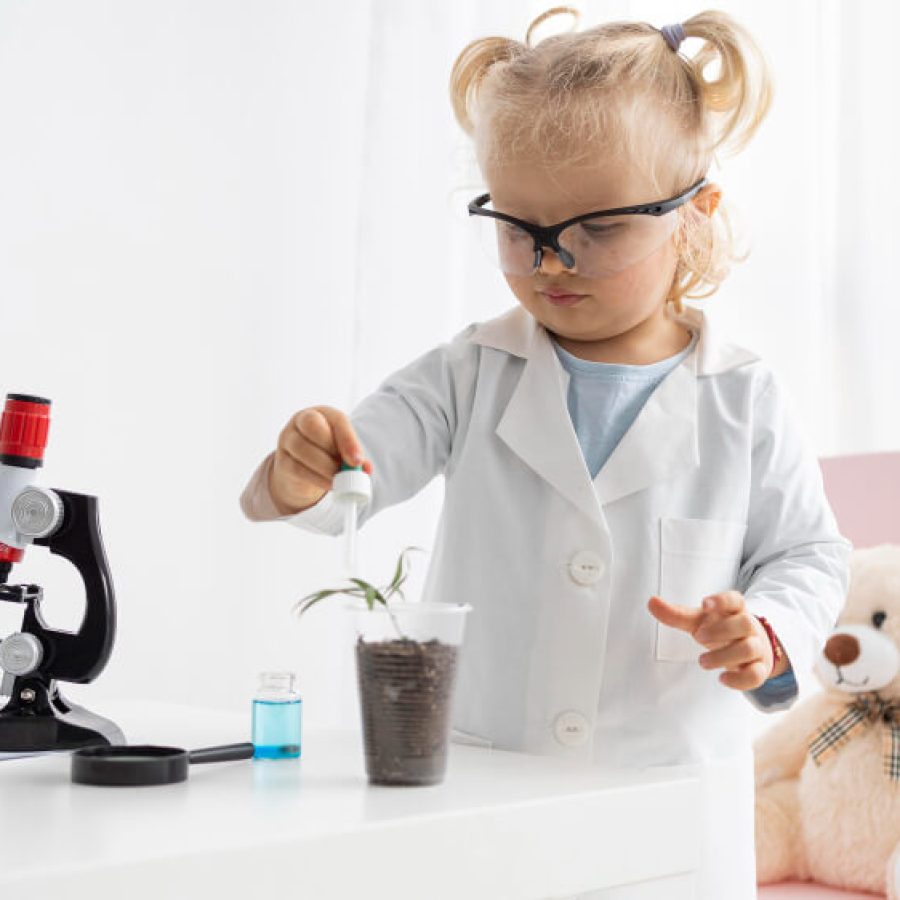Is there an appropriate age when it comes to learning? Should subjects given as difficult be kept from young learners? Scientific disciplines are only apprehended in laboratories? Keep reading to unravel what’s behind early childhood science education – and why you shouldn’t restrain your kids from it.
What Does Teaching Science Mean?
In a first glimpse, you might associate Science with laboratories, chemistry, complex equations and projects such as rocket launches, big scientific breakthroughs or artificial intelligence.
While all these are true when it comes to Science, this subject is more encompassed in our daily lives that we might acknowledge.
Science is a field in itself, but also a process. It’s absolutely related to observing, investigating, creating theories that you try to make sense of, and testing assumptions.
When we stand by the belief that we are surrounded by scientific possibilities at all times, it’s really not an exaggeration. And the sooner children figure that out, become comfortable with the ability of asking questions and putting their curiosity to work, well… they’re well headed for a fulfilling lifetime of learning.
Why Does Early Childhood Science Education Matter?
Teaching Science in such an important stage such as early childhood brings benefits that will follow our Little Ones as they grow.
As you probably already know, education in early childhood paves the way for the upcoming learning experiences children will have.
Creating a passion for learning from a young age is beneficial. Teaching children that there are different ways to learn, and encouraging them to explore that can help children grow confidence in their own ability to study and make new discoveries.
So the key here is: if there are so many benefits in making children passionate about learning as they develop, why should Science be out of it? Not only Science, but any other given “difficult” field, such as Technology, Math or Engineering?
(Yes, of course we’re talking about the importance of STEAM education!)
What To Expect From Early Childhood Science Education
So the value of learning Science is established in terms of the love of studies and curiosities. Great!
There are also other practical benefits that range from this passion for learning and investigating.
- Children develop better abilities of problem solving;
- As a consequence of problem solving, they might become better at making decisions;
- Critical thinking is also enhanced, precisely for the combination of asking the right questions and digging deep on a certain topic;
- Communication and collaboration are enhanced, especially if socialization is part of the projects/activities involving Science learning;
- Reading, writing and dealing with numbers (aka Three R’s in Education) are also intrinsically connected to Science learning, so these skills are also developing as children are studying Science.
Bringing Science Closer to Kids in Early Childhood
Time to get practical: what does it mean to turn Science into something ordinary in your daily life?
Add Science-based games in your playtime routine
If you’ve already made the responsible decision of enrolling your child in a STEAM-based daycare or nursery, you already expect children to learn in different ways.
But the learn-and-fun doesn’t have to end when school is over!
There are plenty of simple games you can enjoy as a family. Learning together as a family is way more fun!
Ask More Questions
When your Little One asks a question of something apparently simple, stimulate them to come up with an answer by themselves instead of giving them a plain answer.
Perceive And Share Science Happenings
During everyday activities, emphasize something that is happening (i.e. a plastic ball dropped and didn’t bounce, but a rubber one did) at that moment and encourage them to make investigations by themselves.
Parents As Ally Of Science Learning
Moms and Dads always want the very best for their children. When it comes to encourage Science learning, the best way to do that is:
- showing them that Science is all around;
- celebrating their achievements when they discover something new and share it with you;
- stimulating their curiosity and stimulating them to push it further.
Teaching children the love for study is easier when you make it part of their lives. Studying doesn’t necessarily mean sitting still for hours and not engaging with the world around you.
Fostering early childhood Science education doesn’t have to turn into something complex or hard to achieve. Encourage your children to take their interests to the next level and you’re up for success.
If you want to make the best decision in choosing the facility that will take your child’s love for learning further, learn how to choose the right daycare!


